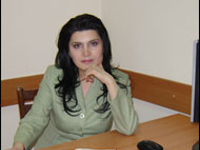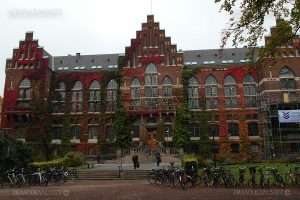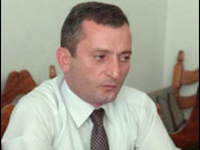Lilit Tadevosyan
Prosecutor of the RA General Prosecutor’s Office Department on Supporting the Prosecution on Criminal Cases in Courts, PhD, lecturer of the law department in Yerevan State University
March 2007
The drastic changes of the society under the current conditions have caused a great number of contradicting processes in the spheres of social and economical, political, national-governmental and legal developments. Today the issues of the establishment of the legal state, stabilization of legality as well as of law and order, preservation and ensuring the constitutional rights and freedoms of the citizens, and the issues of mutual responsibility between the individual and state have become of primary importance. The inevitable crisis occurrences of the transition period, which took place in our society, the radical changes of ownership relations and a number of other occurrences that are typical for this period led to rapid decrease of the living conditions of a vast sector of the society and to social exfoliation. As a result the boundary of permittable and non permittable, lawful and illicit actions has degraded in the consciousness of major part of the citizens, which in its turn promotes to the qualitative change of breaches and crimes, as well as to the increase of their social basis. The motives of criminal activity are stipulated both by the external (objective) and internal (subjective) factors. The reasons and conditions for the growth of crime are diverse. The current disproportional developments of the economic relations and the issuing non proportional division of the society into different social groups, the unemployment, low level of legal consciousness (legal ideology and legal psychology), insufficient level of legal and moral education, domestic legislation and excessive liberalism, the current social and economic conditions and other factors are the reason for flourishing of this permanent companion of the human society.
The psychology of the persons who commit infringements of law is changed under the influence of new economic relations and social conditions, which in its turn gradually leads to the display of the criminal behavior. The crime has acquired new characters and features, and became more professional and organized. And under these conditions the problem of raising the efficiency of the operations of the law protective bodies the quality of struggle against the modern and qualitatively and quantitatively changed crime has become more essential. The efficiency of struggle against crime in generally depends from the condition in which stage of the criminal conduct it has been reviewed and prevented. Obviously, the sooner the law protective bodies are informed about it, the response to preventing the crimes will be more adequate, and the state, the society and citizens interests will suffer less harm in result of this criminal conduct.
The harm to the interests, which are protected by the law, will be minimal when the crime is prevented in the formation stage. Yet, because of the fact that this category of consciousness may be responded only when it has bee revealed, and at the same time the exposure of the criminal intention causes criminal and juridical consequences in case when it is displayed in definite actions of the individual. Then we may definitely argue that the law protective bodies should concentrate attention upon the preliminary criminal conduct, while carrying out activities aimed at prevention of the crimes.
According to the current criminal law, the crime is the only ground for criminal responsibility, which is realizing a conduct, which includes all elements of crime that are provided by the Criminal Code (Article 3 of the Criminal Code of the Republic of Armenia).
Yet, it should be mentioned that under the Article 33 of the Criminal Code of RA the conduct is considered as completed crime in case of the presence of all elements of crime. The legislative body of the Russian Federation has acted in the same manner (Article 8 of the Criminal Code of RF). Inevitably there is a question of the grounds for responsibility in case of inchoate crime. There are a great number of opinions referring to the discussed problem. Some scientists consider as a basis for responsibility of inchoate crime, an act, which includes elements of inchoate crime. Others consider it as commitments of culpable publicly dangerous action, which includes elements of inchoate crime. We think commitment of an act, which includes all elements of inchoate crime (preparation and attempt) as described in the Criminal Code may be considered as a basis for criminal responsibility of the inchoate crime. The legislative body considered the level of realization of the objective aspect of crime when formulating the definition of completed crime, yet without any reference to the subjective direction of the criminal act, or to the level of realization of criminal intention. And this stipulates definite difficulties while defining the moment of completion of crime.
Every crime has different stages of development, yet not necessarily any crime should include all stages at the same tome. There are two development stages of the criminal conduct, which should implicitly occur in all crimes. These are formation of the psychological attitude, which necessarily precedes the criminal conduct, and the criminal act, which harms the public relations, or constitutes conditions for this harm, or jeopardize the public relations with this harm. The other stages of the criminal conduct may either exist or lack in the crimes.
“The stages of crimes that are committed with prior formed intention traditionally originate from the formation of criminal intention. Formation of the criminal intention as a rule is not considered as an individual stage of the crime, because no one may know about such activity yet.” Everything, which is not performed in the shape of the conduct (action or inaction), is beyond the sphere of criminal and juridical regulation. We think such point of view is quite defensible, and when speaking about the origination of the criminal intention we imply the antisocial approach of the individual towards the corresponding public relations, which further from social aspect is shown in negative motives, goals and guilt.
When choosing a course of action it is necessary that the person should take an intentional decision, there should be the guilt and the motivation. The correct definition of these in some cases is rather important, because it is impossible to determine the degree of danger of the act for the public without the motive and the purpose. In addition guilt is one of the fundamental institutes of the Criminal Law, and the fact of the crime in general is connected with its compulsory presence, and it is not unexpected that in the legislative formulation of the crime it is considered as a compulsory feature of the crime. Nevertheless unless the criminal intension which is originated by the person is not realized by his definite conduct and the subject has undertaken definite activities (inactivity) to realize this intention: the mainly subjective category, which has formed cannot have a criminal and legal value.
What is not reflected in the conduct (action or inaction) is out of the sphere of criminal and legal regulation and cannot result a criminal responsibility. Thus revealing of the criminal intention, which has not yet been reflected in a criminal conduct does not constitute a criminal responsibility.
The period, which lies between the moment of origination of the intention and its eventual realization, may be different. As we have already mentioned the intention itself is not punishable, and is necessary only when characterizing the conduct as its final goal. This is why responsibility is possible for activities (inactivity) to realize a crime, which constitute real threat for harming the object.
Such activities conditionally may be divided into two phases of realization of crime: preparation of crime and criminal attempt, which are not obligatory phases for realization of deliberate crime. The subjectively determined action is the source for deliberate crime as well as for any conscious action of the individual that is the individual’s determination to realize definite activities (activity) or to refute to realize definite activities (inactivity). The including of the subjective feature in formulation of completed crime will enable to distinguish the criminal attempts from the completed crime that is from the crime where the intention has been realized completely.
The essence of the inchoate crime is that the process of causing harm to the object of the crime is not finished that is the integrity of the public relations, which are protected by the law from this crime is not hindered. At the same time the objective aspect of corpus delicti, which features are described in the disposition of this or that article of the Special Part of the RA Criminal Code, is not realized partially or completely.
Qualification of the inchoate crime in practice as a rule causes difficulties, because in a number of cases the boarder between preparation of the crime and corpus delicti, the corpus delicti and voluntarily inchoate crime is missing. The illegal character of the inchoate crime and its penalty are characterized primarily by the indirect intention, which is natural for it. That is to say they cannot be realized neither recklessly nor by indirect intention, because when the person who is committing crime does not want occurrence of publicly dangerous consequences, then he cannot be prepared for realization of the action aimed at the crime or prepare such attempt. It is due to mention that this point of view is overwhelming in the theory of criminal law and at the same time is acceptable in the investigation and judiciary practice.
The circumstances, which exist or emerge irrespective of the will of individual, which hinder to final realization of the criminal intention, may be of different features and affect differently upon the level of social danger, and as a result reflect upon the process of taking a decision upon the person in the court. While qualifying the crime in practice it is necessary not only to evaluate correctly the fact of not bringing the criminal action to end, as well as causes of voluntary denial to end the criminal action, because this denial may be forced, yet represented by the subject as voluntary in order to avoid criminal responsibility and the punishment.














